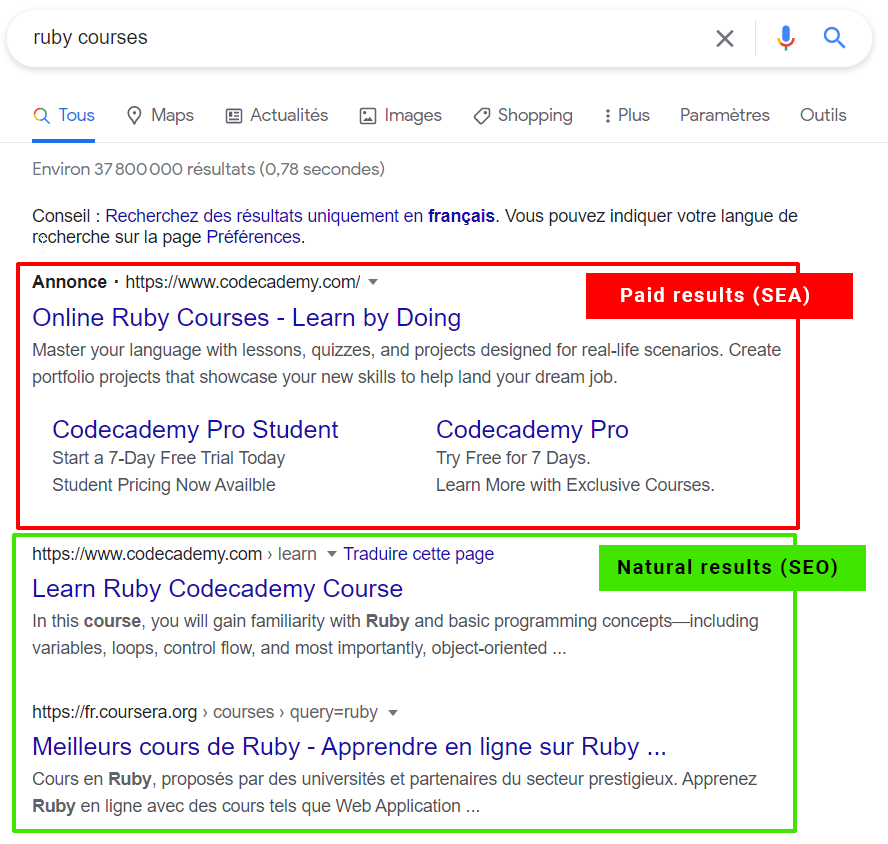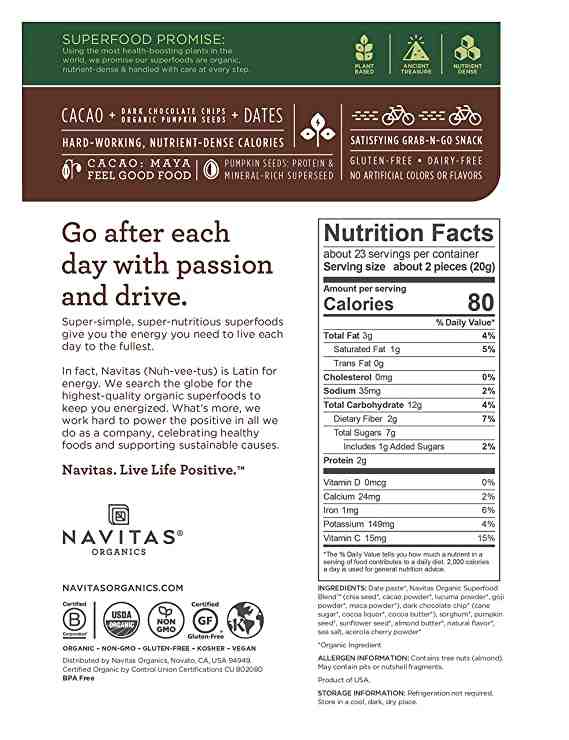Search engine optimization is more commonly known as SEO and is the technical term for setting up your website so that search engines like Google can understand your content well enough to prioritize it in relevant online search results. Show it in search results when relevant. If you make an effort to rank higher for relevant searches, you’ll increase the likelihood that people will see your site when they search, which means more site visits, more engagement, and the opportunity for more sales.
Organic Search Engine Optimization (Organic SEO) refers to the tactics used to achieve higher positions or rankings on the search engine results page in algorithm-driven unpaid search engine results. Keywords are a key decision to improve your rankings. Don’t just look at keywords as individual words, they’re also words and phrases that someone might type into a search engine when looking for what you offer.
Strike the right balance between broad terms that people regularly search to find a business like yours and specific enough that you have a chance to rank high in your particular niche. The following seven helpful tips will help you make the most of organic SEO to promote your business or personal abilities.
1. Appropriate Keywords
Contents
- 1 1. Appropriate Keywords
- 2 2. Web Page Titles and Descriptions
- 3 3. Descriptive Filenames
- 4 4. Relevant Content
- 5 5. Quality Backlinks
- 6 6. Speed Up Your Website
- 7 7. Track Your Progress
- 8 How do I grow organic traffic to my website?
- 9 Why is organic SEO so important?
- 10 Which keywords are best to target in SEO?
- 11 What helps organic search?
- 12 How do you grow organic traffic?
Choose keywords that you would like your website to rank better for. Use terminology that is relevant to your business and that many people would actually search for your business. It’s worth typing the terms into Google and analyzing what suggested results appear for your search queries. Also, try free online tools like Google Keyword Planner and Ubersuggest to gather data on the number of people searching for a particular keyword to gauge how competitive it would be. Have a list of keywords you want to target and prioritize.
2. Web Page Titles and Descriptions

Once you’ve identified the keywords you’ll be targeting, you’ll need to incorporate those words and phrases into the structure of your website. Be sure to make changes within the site editor or have someone managing your site ensure that the titles and descriptions of each page on your site include keywords and also explain what can be found on the site. You’ll need to make sure these edits make sense and reflect the content of the page. Search engines are smart enough to know if you’re just keyword stuffing and not providing any real value to readers.
3. Descriptive Filenames

Text isn’t the only thing search engines look at when analyzing your website. They also pay attention to your images and filenames for your photos and videos that describe what’s featured in them, as well as target keywords.
4. Relevant Content

What types of educational guides and blog posts can you include on your website to showcase your services and products that can be helpful to searchers. They may come to your website to read your informative information and then realize that you also offer services related to the information they were looking for, and they may consider making a purchase.
5. Quality Backlinks

Along with relevant content, search engines also use your website’s reputation as a way to determine your website’s rank. How strong your site’s reputation is can be based on the number of quality backlinks it has returned to it. Backlinks are links to your website from an external site. Backlink quality is essentially based on how good the SEO of the site that links to you is. Getting backlinks can come from being mentioned in articles online.
6. Speed Up Your Website
One of the technical aspects of search engine optimization that affects rankings is page speed and structure. This is an area where you will definitely need outside help in the form of a web developer with expertise in SEO to get your site up and running faster.
7. Track Your Progress
It is important to be able to measure your progress in order to manage the ups and downs of your website in a positive way. Once you’ve gone ahead and implemented some of these other SEO changes, you can take a deeper look at whether you’ve made a difference by tracking the number of visitors to your website. Keep in mind that search engines can take days or even weeks to re-rate your website. Keep tracking your target keywords to make sure they still make sense to use.
Implementing these seven tips can make your use of organic SEO more effective in setting your website apart from the competition and increasing the number of viewers who can connect with your products, services and content.
How do I grow organic traffic to my website?
How to Increase Organic Traffic: 11 Best SEO Tips
- Optimize for your readers, not search engines. …
- Blog regularly. …
- Get involved in the blogosphere. …
- Use long keywords. …
- Drop your target. …
- Create quality content consistently. …
- Use internal links. …
- Encourage inbound links.
Why is my website not getting organic traffic? If you target the wrong keywords, you won’t rank favorably and you’ll be less visible to your audience. This in turn will lead to less organic traffic to your website. Other reasons why your keywords are not performing on your site are: You are too keyword focused.
Why is organic SEO so important?
With relevant and quality content, organic SEO will generate more clicks. As users read useful content that solves their problems or answers their questions, greater trust is built among users. When you match keywords with user intent, it means that the longer the user searches, the more consistently they’ll find you.
Why is organic search better? According to Google’s Economic Impact Report, organic search is 5 times more valuable than Google ads. Paid search is a good short-term marketing solution, but organic search creates long-term, compound ROI. Social media helps you build your brand, but organic search is what helps you target high-intent consumers.
Why is organic ranking important?
Organic traffic is the best source of traffic! Websites with high search engine rankings are significantly more likely to be discovered by potential customers. This means that the longer a visitor spends on your site, the more likely they are to convert into sales or leads.
Why is organic traffic better?
Better ROI The return on investment (ROI) can be much better for organic versus paid traffic. When you pay for traffic, you have to invest time and money in creating ads. If you have an organic search result that gets the same number of clicks as your ad, the organic result will have a better ROI.
Why is organic search so important?
Why is organic traffic important? Organic traffic is important because it is targeted. Users who visit your website from organic search engine results have a very specific intent and if you can provide them with a solution or answer to their question, they are more likely to convert.
What does organic rank mean?
For a given keyword, organic ranking refers to where the product appears on Amazon’s search engine results pages (SERPs). Meanwhile, Amazon Best Sellers Rank is useful for estimating the monthly sales frequency of a product. Any relevant keyword you may enter must return a set of results based on a set of criteria.
What is organic strategy SEO?
Organic SEO is the practice of using white SEO strategies to increase your website traffic and improve your site’s presence in unpaid search engine results. The word organic is used to distinguish between natural methods of search engine optimization and paid tactics for ranking in the SERPs.
What is organic search strategy?
Organic SEO, also called organic search engine optimization, is the process of improving your ranking in the unpaid (or organic) search results of search engines such as Google, Bing, or DuckDuckGo. Organic SEO tactics include keyword research, link building, content creation, and more.
What is organic traffic and why is it important?
Organic traffic is traffic that comes to your website from unpaid sources/searches such as Bing, Google and Yahoo. It plays a big role in the success of the business. Therefore, its importance cannot be ignored. Research shows that it represents over 60% of the total traffic on the website.
What is meant by organic traffic?
Organic traffic is those visitors who come to your website from unpaid sources, i.e. essentially free traffic. Organic sources here include search engines like Google, Yahoo or Bing. A brand of digital marketing that focuses on improving organic traffic is called Search Engine Optimization.
How does organic traffic work?
Organic traffic, simply put, is traffic that comes from Google and the search engine results pages (SERPs) of other search engines. Think of it this way; search for a given topic, for example “bike repair shops†and see a list of results. Click on one of those results to visit the brand’s website.
Why is it called organic traffic?
First, the term traffic refers to all visits that a user makes to a website or mobile application. And more precisely, the term âorganicâ (or ânatural) traffic refers to the number of visitors that come from search engine results (as opposed to a paid source of traffic).
Which keywords are best to target in SEO?
Long tail keywords are long (typically 4+ words) terms that searchers use on Google and other search engines. And they tend to have less difficulty with keywords compared to 1-3 word “head phrases”. So for people new to SEO, long tails are usually the best keywords to start with.
Which keywords bring in the most traffic? To determine which SEO keywords to use, you’ll need to strike a balance between search volume and keyword weight. To improve your chances of ranking high and increasing your website traffic, go for high volume/low keyword weight (competition).
What are SEO friendly keywords?
Your SEO keywords are the keywords and phrases in your web content that allow people to find your site through search engines. A website that is well optimized for search engines âspeaks the same languageâ as your potential visitor base with SEO keywords that help connect searchers to your website.
What are examples of SEO keywords?
For example, let’s say you want to make a page about “keto lunch”. Well, if your site is new, the keyword âketo lunchâ is probably too competitive. But when you type keto lunch into Google, you get a list of long-tail keyword suggestions. Pretty sweet.
What is keyword according to SEO?
Keywords are ideas and topics that define what your content is about. In SEO terms, these are words and phrases that searchers enter into search engines, also called “search queries”. If you boil down everything on your page – all images, videos, copy, etc.
What helps organic search?
By adding a page-specific keyword to the ALT tag on your website, you can improve your website’s organic search ranking.
What makes search results organic? Organic search results are listings on a search engine results page (SERP) that appear due to factors such as relevance to a search term and valid search engine optimization (SEO) efforts, not due to search engine marketing (SEM) or gimmicks.
How do you grow organic traffic?
Ranking for Net-New Keywords While ranking for net-new keywords is arguably the most effective driver of organic traffic, it also requires the most effort. There are several ways to find net new keywords: Identify the keywords’ weaknesses compared to competitors. Look for keywords related to the ones you’re already ranking for.
How can I get free organic traffic? Blog regularly. Blogging is perhaps the most effective way to increase your organic site traffic. It allows you to go deeper than your website allows and creates a large catalog of useful, persona-optimized content focused on your niche market.
How does organic traffic work?
Organic traffic, simply put, is traffic that comes from Google and the search engine results pages (SERPs) of other search engines. Think of it this way; search for a given topic, for example “bike repair shops†and see a list of results. Click on one of those results to visit the brand’s website.
How does organic search results work?
Unlike paid search results (pay-per-click advertising), which are populated through an auction system, organic search results are based on relevance to the user’s search query, links and domain authority, and other organic ranking factors.
How do you explain organic traffic?
Organic traffic is those visitors who come to your website from unpaid sources, i.e. essentially free traffic. Organic sources here include search engines like Google, Yahoo or Bing. A brand of digital marketing that focuses on improving organic traffic is called Search Engine Optimization.
Do you have to pay for organic traffic?
Organic traffic is any traffic that comes to your site from a search engine, but is not paid for. Any organic traffic will be a result of your inbound marketing and SEO efforts. Paid search traffic is any traffic that comes from a paid search campaign you’ve run on a search engine like Google or Bing.
What do you mean by organic traffic?
Organic traffic is those visitors who come to your website from unpaid sources, i.e. essentially free traffic. Organic sources here include search engines like Google, Yahoo or Bing. A brand of digital marketing that focuses on improving organic traffic is called Search Engine Optimization.
What is organic traffic and why is it important?
Organic traffic is traffic that comes to your website from unpaid sources/searches such as Bing, Google and Yahoo. It plays a big role in the success of the business. Therefore, its importance cannot be ignored. Research shows that it represents over 60% of the total traffic on the website.
What is defined as organic traffic in Google Analytics?
When you see organic search traffic in Google Analytics, it refers to traffic that came to your site through unpaid search results on search engines like Google, Yahoo, or Bing. You can find organic traffic in Google Analytics in the Acquisition section. Click All Traffic, then Channels.
What is organic and inorganic traffic?
Organic results provide long-term results, while inorganic results provide instant rankings, attracting huge traffic. The biggest negative factor for Inorganic results is that the ranking drops as soon as the decision is not made to stop serving ads.
